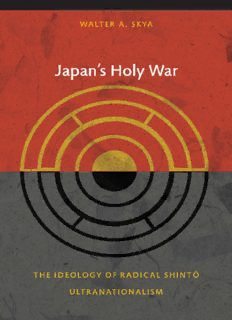
Japan’s Holy War: The Ideology of Radical Shinto Ultranationalism PDF
Preview Japan’s Holy War: The Ideology of Radical Shinto Ultranationalism
Japan’s Holy War asia-pacific: culture, politics, and society Editors: Rey Chow, H. D. Harootunian, and Masao Miyoshi WALTER A. SKYA Japan’s Holy War THE IDEOLOGY OF RADICAL SHINTO¯ ULTRANATIONALISM Duke University Press Durham and London 2009 ∫ 2009 Duke University Press All rights reserved Printed in the United States of America on acid-free paper $ Designed by C. H. Westmoreland Typeset in Arno with Magma Compact display by Keystone Typesetting, Inc. Library of Congress Cataloging-in- Publication Data appear on the last printed page of this book. dedicated to my wife, mariko, daughter, amy, and son, mark Contents acknowledgments ix introduction 1 I. Emperor Ideology and the Debate over State and Sovereignty in the Late Meiji Period 1. From Constitutional Monarchy to Absolutist Theory 33 2. Hozumi Yatsuka: The Religious Völkisch Family-State 53 3. Minobe Tatsukichi: The Secularization of Politics 82 4. Kita Ikki: A Social-Democratic Critique of Absolute Monarchy 112 II. Emperor Ideology and the Debate over State and Sovereignty in the Taisho¯ Period 5. The Rise of Mass Nationalism 131 6. Uesugi Shinkichi: The Emperor and the Masses 153 7. Kakehi Katsuhiko: The Japanese Emperor State at the Center of the Shinto¯ Cosmology 185 III. Radical Shinto¯ Ultranationalism and Its Triumph in the Early Sho¯wa Period 8. Terrorism in the Land of the Gods 229 9. Orthodoxation of a Holy War 262 conclusion 297 notes 329 select bibliography 363 index 379 Acknowledgments I am deeply grateful to a number of scholars in the United States, Japan, and Europe who have taught me and enthusiastically supported me and my research projects over the past two decades. First, and foremost, how- ever, I owe a special debt of gratitude to Professor Harry Harootunian, my main advisor at the University of Chicago. I wish to thank this remark- able scholar once again for welcoming me to Chicago. I could not have asked for a better mentor. It has been said that higher education is America’s greatest industry because the American system is better than any other at developing the critical faculties of the mind. I am convinced that scholars like Harootunian deserve credit for this nation’s great in- novation because they teach their students to think. The volume of ideas coming from the mind of this prolific writer over the years has never ceased to amaze me. Equally important, he has had the intellectual vigor and personal courage to challenge entrenched orthodoxies. Without his encouragement and support, this book on Shinto¯ nationalism, a topic that has been conspicuously shunned by American academics, would have not been possible. Also, I feel I was extremely fortunate to have had the privilege to attend the University of Chicago during a time when Chi- cago was an intellectual powerhouse of world-class scholars in the field of Japanese studies. In addition to Harry Harootunian, I had the opportu- nity to learn from professors Tetsuo Najita, Akira Iriye, Norma Field, and Bernard Silberman, all of whom contributed a nexus of courses, lectures, visiting scholars, symposiums, and study groups that made for a truly stimulating and exciting intellectual climate for graduate studies. Many other scholars offered me advice and assistance throughout the various stages in the preparation of this book. However, I would first like to thank Reynolds Smith, Executive Editor of Duke University Press, for providing three conscientious anonymous readers for my manuscript whose careful and diligent reading greatly improved my work. My special thanks and appreciation go to the following individuals: Professor Bruce
Description: